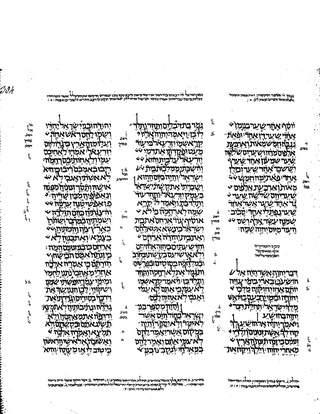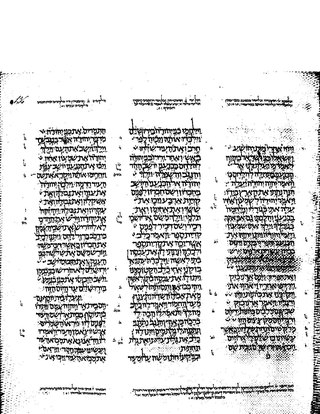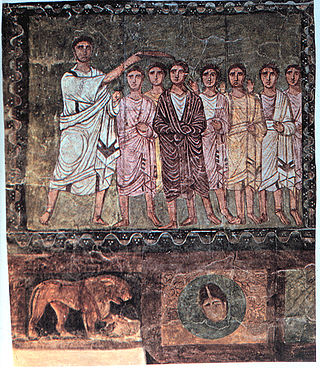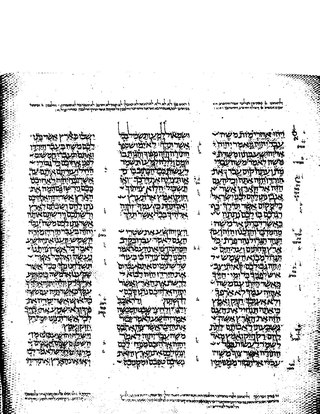
Zephaniah 2 is the second chapter of the Book of Zephaniah in the Hebrew Bible or the Old Testament of the Christian Bible. This book contains the prophecies attributed to the prophet Zephaniah, and is a part of the Book of the Twelve Minor Prophets. This chapter contains a call to penitence and oracles against nations.

1 Samuel 3 is the third chapter of the First Book of Samuel in the Old Testament of the Christian Bible or the first part of the Books of Samuel in the Hebrew Bible. According to Jewish tradition the book was attributed to the prophet Samuel, with additions by the prophets Gad and Nathan, but modern scholars view it as a composition of a number of independent texts of various ages from c. 630–540 BCE. This chapter focuses on the calling of Samuel, in a section concerning the life of Samuel.

1 Samuel 5 is the fifth chapter of the First Book of Samuel in the Old Testament of the Christian Bible or the first part of the Books of Samuel in the Hebrew Bible. According to Jewish tradition the book was attributed to the prophet Samuel, with additions by the prophets Gad and Nathan, but modern scholars view it as a composition of a number of independent texts of various ages from c. 630–540 BCE. This chapter describes how the Ark of Covenant was taken by the Philistines, a part of the "Ark Narrative" within a section concerning the life of Samuel.

1 Samuel 17 is the seventeenth chapter of the First Book of Samuel in the Old Testament of the Christian Bible or the first part of the Books of Samuel in the Hebrew Bible. According to Jewish tradition the book was attributed to the prophet Samuel, with additions by the prophets Gad and Nathan, but modern scholars view it as a composition of a number of independent texts of various ages from c. 630–540 BCE. This chapter contains the battle of David with Goliath, the Philistine. This is within a section comprising 1 Samuel 16 to 2 Samuel 5 which records the rise of David as the king of Israel.

Judges 20 is the twentieth chapter of the Book of Judges in the Old Testament or the Hebrew Bible. According to Jewish tradition the book was attributed to the prophet Samuel, but modern scholars view it as part of the Deuteronomistic History, which spans in the books of Deuteronomy to 2 Kings, attributed to nationalistic and devotedly Yahwistic writers during the time of the reformer Judean king Josiah in 7th century BCE. This chapter records the war between the tribe of Benjamin and the other eleven tribes of Israel, belonging to a section comprising Judges 17 to 21.

1 Chronicles 13 is the thirteenth chapter of the Books of Chronicles in the Hebrew Bible or the First Book of Chronicles in the Old Testament of the Christian Bible. The book is compiled from older sources by an unknown person or group, designated by modern scholars as "the Chronicler", and had the final shape established in late fifth or fourth century BCE. This chapter contains the account of an unsuccessful attempt to bring the ark of the covenant to Jerusalem by David. The whole chapter belongs to the section focusing on the kingship of David.

1 Samuel 4 is the fourth chapter of the First Book of Samuel in the Old Testament of the Christian Bible or the first part of the Books of Samuel in the Hebrew Bible. According to Jewish tradition the book was attributed to the prophet Samuel, with additions by the prophets Gad and Nathan, but modern scholars view it as a composition of a number of independent texts of various ages from c. 630–540 BCE. This chapter describes how the Ark of Covenant was taken by the Philistines, a part of the "Ark Narrative" within a section concerning the life of Samuel.

1 Samuel 6 is the sixth chapter of the First Book of Samuel in the Old Testament of the Christian Bible or the first part of the Books of Samuel in the Hebrew Bible. According to Jewish tradition the book was attributed to the prophet Samuel, with additions by the prophets Gad and Nathan, but modern scholars view it as a composition of a number of independent texts of various ages from c. 630–540 BCE. This chapter describes how the Ark of Covenant was returned to Israel by the Philistines, a part of the "Ark Narrative" within a section concerning the life of Samuel.

1 Samuel 8 is the eighth chapter of the First Book of Samuel in the Old Testament of the Christian Bible or the first part of the Books of Samuel in the Hebrew Bible. According to Jewish tradition the book was attributed to the prophet Samuel, with additions by the prophets Gad and Nathan, but modern scholars view it as a composition of a number of independent texts of various ages from c. 630–540 BCE. This chapter records the request from the elders of Israel to Samuel for a king, part of a section comprising 1 Samuel 7–15 which records the rise of the monarchy in Israel and the account of the first years of King Saul.

1 Samuel 10 is the tenth chapter of the First Book of Samuel in the Old Testament of the Christian Bible or the first part of the Books of Samuel in the Hebrew Bible. According to Jewish tradition the book was attributed to the prophet Samuel, with additions by the prophets Gad and Nathan, but modern scholars view it as a composition of a number of independent texts of various ages from c. 630–540 BCE. This chapter describes the anointing of Saul as the first king of Israel, within a section comprising 1 Samuel 7–15 which records the rise of the monarchy in Israel and the account of the first years of King Saul.

1 Samuel 14 is the fourteenth chapter of the First Book of Samuel in the Old Testament of the Christian Bible or the first part of the Books of Samuel in the Hebrew Bible. According to Jewish tradition the book was attributed to the prophet Samuel, with additions by the prophets Gad and Nathan, but modern scholars view it as a composition of a number of independent texts of various ages from c. 630–540 BCE. This chapter contains Saul's actions against the Philistines. This is within a section comprising 1 Samuel 7–15 which records the rise of the monarchy in Israel and the account of the first years of King Saul.

1 Samuel 16 is the sixteenth chapter of the First Book of Samuel in the Old Testament of the Christian Bible or the first part of the Books of Samuel in the Hebrew Bible. According to Jewish tradition the book was attributed to the prophet Samuel, with additions by the prophets Gad and Nathan, but modern scholars view it as a composition of a number of independent texts of various ages from c. 630–540 BCE. This chapter contains the anointing of David by Samuel and David's early service for Saul. This is within a section comprising 1 Samuel 16 to 2 Samuel 5 which records the rise of David as the king of Israel.

1 Samuel 21 is the twenty-first chapter of the First Book of Samuel in the Old Testament of the Christian Bible or the first part of the Books of Samuel in the Hebrew Bible. According to Jewish tradition the book was attributed to the prophet Samuel, with additions by the prophets Gad and Nathan, but modern scholars view it as a composition of a number of independent texts of various ages from c. 630–540 BCE. This chapter contains the account of David's escape from Saul's repeated attempts to kill him. This is within a section comprising 1 Samuel 16 to 2 Samuel 5 which records the rise of David as the king of Israel.

1 Samuel 22 is the twenty-second chapter of the First Book of Samuel in the Old Testament of the Christian Bible or the first part of the Books of Samuel in the Hebrew Bible. According to Jewish tradition the book was attributed to the prophet Samuel, with additions by the prophets Gad and Nathan, but modern scholars view it as a composition of a number of independent texts of various ages from c. 630–540 BCE. This chapter contains the account of David's escape from Saul's repeated attempts to kill him and the massacre of the priests in Nob. This is within a section comprising 1 Samuel 16 to 2 Samuel 5 which records the rise of David as the king of Israel.

1 Samuel 27 is the twenty-seventh chapter of the First Book of Samuel in the Old Testament of the Christian Bible or the first part of the Books of Samuel in the Hebrew Bible. According to Jewish tradition the book was attributed to the prophet Samuel, with additions by the prophets Gad and Nathan, but modern scholars view it as a composition of a number of independent texts of various ages from c. 630–540 BCE. This chapter contains the account of David's escape from Saul's repeated attempts to kill him. This is within a section comprising 1 Samuel 16 to 2 Samuel 5 which records the rise of David as the king of Israel.

1 Samuel 31 is the thirty-first chapter of the First Book of Samuel in the Old Testament of the Christian Bible or the first part of the Books of Samuel in the Hebrew Bible. According to Jewish tradition, the book was attributed to the prophet Samuel, with additions by the prophets Gad and Nathan, but modern scholars view it as a composition of a number of independent texts of various ages from c. 630–540 BCE. This chapter contains the account of Saul's repeated attempts to kill him. This is within a section comprising 1 Samuel 16 to 2 Samuel 5 which records the rise of David as the king of Israel.

2 Samuel 6 is the sixth chapter of the Second Book of Samuel in the Old Testament of the Christian Bible or the second part of Books of Samuel in the Hebrew Bible. According to Jewish tradition the book was attributed to the prophet Samuel, with additions by the prophets Gad and Nathan, but modern scholars view it as a composition of a number of independent texts of various ages from c. 630–540 BCE. This chapter contains the account of David's reign in Jerusalem. This is within a section comprising 2 Samuel 2–8 which deals with the period when David set up his kingdom.

2 Samuel 15 is the fifteenth chapter of the Second Book of Samuel in the Old Testament of the Christian Bible or the second part of Books of Samuel in the Hebrew Bible. According to Jewish tradition the book was attributed to the prophet Samuel, with additions by the prophets Gad and Nathan, but modern scholars view it as a composition of a number of independent texts of various ages from c. 630–540 BCE. This chapter contains the account of David's reign in Jerusalem. This is within a section comprising 2 Samuel 9–20 and continued to 1 Kings 1–2 which deal with the power struggles among David's sons to succeed David's throne until 'the kingdom was established in the hand of Solomon'.

Joshua 13 is the thirteenth chapter of the Book of Joshua in the Hebrew Bible or in the Old Testament of the Christian Bible. According to Jewish tradition the book was attributed to the Joshua, with additions by the high priests Eleazar and Phinehas, but modern scholars view it as part of the Deuteronomistic History, which spans the books of Deuteronomy to 2 Kings, attributed to nationalistic and devotedly Yahwistic writers during the time of the reformer Judean king Josiah in 7th century BCE. This chapter records the list of land still to be conquered and the land allotments for the tribes Reuben, Gad and half of the Manasseh (east), a part of a section comprising Joshua 13:1–21:45 about the Israelites allotting the land of Canaan.

Joshua 19 is the nineteenth chapter of the Book of Joshua in the Hebrew Bible or in the Old Testament of the Christian Bible. According to Jewish tradition the book was attributed to the Joshua, with additions by the high priests Eleazar and Phinehas, but modern scholars view it as part of the Deuteronomistic History, which spans the books of Deuteronomy to 2 Kings, attributed to nationalistic and devotedly Yahwistic writers during the time of the reformer Judean king Josiah in the 7th century BCE. This chapter records the further allotment of land for the tribes of Israel, especially the tribes of Simeon, Zebulun, Issachar, Asher, Naphtali and Dan, as well as Joshua's Inheritance, a part of a section comprising Joshua 13:1–21:45 about the Israelites allotting the land of Canaan.











